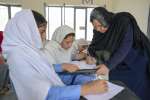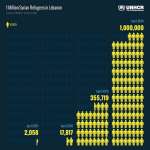Resources for ages 9-11 in Art
Teaching Tools, 24 April 2007

Narin, aged 13. His father disappeared. His sister was sold. After repatriating to Cambodia, he was placed in an orphanage with his little brother. There are many thousands of refugee children in a similar situation. UNHCR tries its best to trace missing relatives and to reunite fragmented families, both in countries of asylum and after refugees have returned to their home countries.
Narin's Story
from Refugee Children (Geneva, UNHCR, 1993)
Narin is a Cambodian boy who spent many years as a refugee in Thailand, watching his family disappear one by one. He now lives in an orphanage outside the Cambodian capital of Phnom Penh.
"For most of my 13 years, Cambodia was a homeland I knew only from the stories I heard.
What I heard was that Cambodia was a country at war. A country where people died. A country where people became refugees like me.
For most of my life, my home was Site 2, a big refugee camp in Thailand.
I am not sure if I was born in Site 2. My brother and sister were born there and that was where my parents left us.
But Site 2 was not that bad. We used to have a good life there until my father was arrested five years ago. I was number one in class. I studied very hard because education leads to a good job.
When my father was sent to jail, my mother sold the family's food coupons to pay for him to be released. Later she sold my sister to a couple who had no children so that she could pay for our food.
When my father got out of jail, he told us he had to go to Cambodia to earn money to get our food coupons back. But he never came back.
A Lost Childhood
So instead of going to school or playing outside, I went out to work.
Sometimes I went to a cemetery to look for mint to sell or exchange for cane sugar, and then we would exchange the sugar for rice.
During this time, my mother was so sad that she was always drinking. She bought liquor with the money we had earned for food.
One day we had no food at all and my mother was drunk. So they took my brother and me to an orphanage. The orphanage asked the people who bought my sister if they wanted us too. They refused.
I learned then that my mother had gone to live with another man.
Because I missed my sister so much, I went to where she was living. I went in and asked for a drink of water and I saw her face. I did not tell the couple that she was my sister even though I was so sad.
Today, I live with my brother in an orphanage in Takhmau District, about seven kilometers outside Phnom Penh.
I have a good life in the orphanage, but I always wish to have my sister back."




























